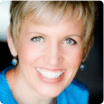
Now, for the women only – Don’t be afraid to call it like it is. If you see a panel or a track that you want to be a part of, and it is dominated by men – let the conference directors know. With all the schedule changes, and organization required to put a conference together, that is an easy thing for the conference directors to miss. Being willing to help point out the problem AND improve the ratio all at once can be very compelling for conference directors.


At SEOmoz, we’re always on the lookout for women in our community and industry who are going above and beyond. Even in the “off season,” if someone really stands out (regardless of gender), we’re making our list of potential pulls for MozCon speakers. The people who are on top of their field, know their niche, and show the industry something new, innovative, or just amazing.

speak, seek out opportunities and fight for them. Do your research, find holes that you can fill, and pitch yourself. If you want to better your odds, work at building your brand first. Guest blog on respected sites, participate in discussions, and establish yourself as an expert. By building a reputation for yourself you’ll increase the odds that these conference organizers (if they’re smart) will reach out to you. But we shouldn’t be afraid of pitching.

Lastly, if Meg Whitman, Marissa Mayer, or Sheryl Sandberg should want to pitch for New Orleans, I like your chances of getting in 😉 “If good looks and charm get me in the door, God help ’em once I am through.” -Katharine Ross, The Final Countdown 1980.

Another suggestion for those wanting to speak is talk to current speakers. That’s what I did when I started thinking about speaking. I asked a bunch of questions and that helped me gain the confidence to pitch. I would be more than happy to talk to women who think they might want to try speaking.


You have to be a student before you can be a teacher and I think that watching and absorbing the really great speakers has helped me be a decent one. I plan to keep improving every single show until someday I hopefully get asked to keynote something. I have a goal around speaking and it’s helped me push myself. Hopefully along the way, I inspire a group of women to pitch more, and take the stage. I see no reason why the ratio can’t change and swing more evenly. It already has improved since I started and I expect that to continue.
To the women that want to start speaking I’d say – start watching others, start practicing, build your confidence and pitch everything. You have a unique voice, we all do, so why not start sharing it up on stage. You got this.

I’m not as involved in working with coordinators as in the past. When I’m chair of a particular conference, I work more on the initial programming aspect, and Chris Sherman follows-up with coordinators. I don’t think he’s put that particular call out recently. However, our priority lately has been to focus on going beyond pitches to bring in good speakers overall, so that we’re not relying just on pitches period.
I can tell you personally that I do try to ensure I have good women speakers as part of my panels. One panel I’m coordinating now has five pitches from men. All of those are good pitches. I’ve picked two, and the third spot I’ve still left open, because I wanted to see if I could find a good woman speaker to fill it. But it also feels odd that I’ve got three qualified men that I’m likely passing over simply because they are men. Still, in other panels, some of the few that are invite-only, the onus is much more on the coordinator to ensure they have a diverse panel. Those panels in particular I find easier to make diverse, perhaps because I’m forced more to look beyond the pitches. And yet, we like having a pitch process to help ensure we’re not overlooking possible new speakers who deserve a shot.
Overall, it’s a tricky balancing act. You want a diverse panel, which includes gender diversity, race diversity (Panels being all-white is perhaps a bigger issue than them being all-male), diversity in the types of experiences represented (are you an SEO that works with enterprises, small businesses, local, etc.), company diversity (you don’t want a single company seeming to dominate the agenda) and most of all, you want a panel of quality speakers.
I think it also helps that we have many women who coordinate panels at our shows. They’re in positions of deciding who gets to speak and who doesn’t. And, it’s not uncommon that a woman might oversee a panel that ends up being all men, while a man might oversee a panel that ends up being all women.




Software Entrepreneur, SEO Tech, InfoSec
A reason women do comparatively well in our industry is that women are well represented by the advertising industry as a whole. Women rarely reached the top until digital age, which blew up the old stereo types to make traditionalists compete on their merits. Haha. I think you’re on to something deeper than our conferences here. The reason women are under represented in a public setting, like at conferences, has to do with some pretty complex ideas.
In our context, we would only scratch the surface, i.e. expectations of women to yield to men in debate, or risk coming across wrongly emasculating. The chance one might be chosen to speak is flimsy enough all its own, let alone that women have to be attentive to the way they come across (nurturing is good but not too much, smart is good but not too tough). There is a tremendous amount of pressure for women to be and act a certain way in public, or we risk getting miscast, improperly labeled and limited.
More Opinions, 2007-2013
- SEM No Longer A Boys Club?
- How To Exclude Women Without Really Trying,
- Beating the Odds — How We got 25% Women Speakers for JSConf EU 2012
- Should men boycott all-male panels at conferences?
- Diversity in tech: still an issue in 2013?
- A Simple Suggestion to Help Phase Out All-Male Panels at Tech Conferences
- The Panel Pledge: A Follow-Up
- Would You Take A Pledge to Not Speak at All-Male Panels at Tech Conferences?
Adam & Eve image ©Howgill – Fotolia











